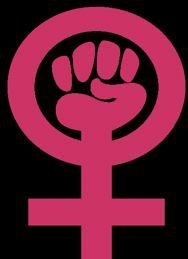
The younger Walker discussed her feminist-model upbringing in a May 2008 Daily Mail piece entitled "How my mother’s fanatical views tore us apart." She recounts how her mother sacrificed family on the altar of ideology, neglecting her in favor of career and fame. She tells of being raised — if one could characterize an absentee parent as involved in that endeavor — by a woman who viewed her as an element of something Alice truly despised: the family. Her mother described her birth as a "calamity" and was so opposed to child-bearing (and, I can infer, envious of her daughter’s happiness) that she disowned Rebecca while the latter was pregnant. Rebecca Walker writes of that day and Alice’s response to her request that she acknowledge how she had hurt her: "She wrote me a letter saying that our relationship had been inconsequential for years and that she was no longer interested in being my mother. She even signed the letter with her first name, rather than ‘Mom.’"
Some may think Rebecca Walker was just washing her dirty laundry in public, but there is method to her madness: she uses her experience to illustrate the consequences of feminist indoctrination. And I will do this as well, for it is far more important to discredit bad ideas than the people in their grip.
We tend not to question that with which we were raised, but my outside-the-box mind has always been struck by the existence of this thing called feminism. "I’m a feminist," some women will say. But what if I called myself a "masculinist"? Wouldn’t you find that strange? Sure, many will aver that we needed a movement to accord women dignity, and that movement needed a name. Yet would we assume child abuse could not be combated without originating an ideology, perhaps one called "juvenilism"?
It is of course true that something was required to afford humans — not just women, not just men, and not just juveniles — dignity. A look back into the darkness of antiquity, with its rampant slavery, human sacrifice, cannibalism, and predatory conquest, should make that crystal clear. That something has existed for millennia. It was, and is, called Christianity.
Christianity also elevated the status of women, who in antiquity as well as in some parts of the world today were not only viewed as inferior to men but oftentimes were regarded as property with no legal rights. Christianity changed that. But Christianity also entails responsibilities for women as well as for men.
Feminists claim that they want to "liberate" women, but the liberation they seek is not the liberation of Christianity. Their "liberation" is really libertinism since it is based on an escape from all responsibility, including even the supposed shackles of marriage and child-rearing. Ironically, the resulting moral anarchy can only result in the loss of the "liberated" status feminists claim to seek for women.
Yet in a strange way, feminists who assert that children and marriage enslave women are right, figuratively speaking. The truth is that complete independence and freedom are an illusion, as we are all shackled by something. Born into a material world, we are limited by the confines of time and space; living in the flesh, we are limited by a body with finite capacity, and it will inevitably deteriorate and limit us further. If we are to bow to morality, we are limited by it and the responsibilities it prescribes. We attend school and have a responsibility to our teachers, then get a job and are beholden to our employers. Good citizenship demands we do our duty for country, and the public officials we elect are obligated to serve us and abide by the Constitution. In other words, we all have various roles (a word implying boundaries, which limit our freedom) to fulfill, born into that of human, assigned those of student and citizen, and perhaps taking on that of employee or public official.
Then there is that more important role we assume, father or mother. It is the highest calling save perhaps the religious life because if it is performed well, we will have good students, citizens, employees, and public officials. We will have a healthy nation. This is why the family has been called the central building block of civilization, and an edifice is only as strong as the material that is its essence.
Now, it is quite obvious that a family can only be sound if the parents perform their roles. If a father refuses to fulfill a father’s obligations and abandons his wife and children, disaster can ensue; even if his refusal simply involves absence due to excessive work or nights out with the boys, there are consequences. In point of fact, he is enslaved, or at least he should be, to that role of husband and father. This harks back to Paul the Apostle’s command to spouses, "Be subject to each other."
Yet "each other" denotes a two-way street, meaning, women have a role, too. But if you speak of a woman’s "role," you’re now thought akin to the Taliban, a throwback to a misbegotten era. This is why I have spent so much time discussing roles, for we all have them. Thus, to eschew such discussion with respect to women is not to render them equal, but to give them a special dispensation. And to seek to free woman from a legitimate role is not to liberate her from the bounds of men, but those of morality.
This brings us to the destructiveness of feminism. It has done far more than free the fairer sex from traditional legal restrictions; the ideology has also loosed it from traditional social obligations. This is not to say — and I take pains to emphasize this, lest feminism’s exponents appear to walk the high road — that they have freed women from all such social codes. No, they have simply replaced them with a different set, that which pressures women to have a career and chase shallow dreams, that which frowns upon devotion to hearth and home. Espousing this new paradigm, feminist icon Simone de Beauvoir said in 1974, "No woman should be authorized to stay at home to raise her children. Society should be totally different. Women should not have that choice, precisely because if there is such a choice, too many women will make that one." My, my, so much for being "pro-choice."
So what has feminism wrought? By convincing women their primary role — their most important one — is not that of wife and mother, feminism is destroying the family. And when you destroy the family — that central building block of nations — you destroy civilization. This cannot be overstated. Woman has often been called the "heart" of the family, and for good reason. What substitute can there be for a kind, devoted, nurturing mother who is there not just to hear about the tears, but be available when they need to be wiped away; not just to see the sports trophy, but the look on Timmy’s face when he receives it; not just to hear about Mary taking her first step, but to witness it? A good mother is as indispensable and her role as beautiful as her burdens are great. G.K. Chesterton once wrote about this glory of motherhood, saying:
To be Queen Elizabeth within a definite area, deciding sales, banquets, labours, and holidays; to be Whitely within a certain area, providing toys, boots, cakes and books; to be Aristotle within a certain area, teaching morals, manners, theology, and hygiene; I can imagine how this can exhaust the mind, but I cannot imagine how it could narrow it. How can it be a large career to tell other people about the Rule of Three, and a small career to tell one’s own children about the universe? How can it be broad to be the same thing to everyone and narrow to be everything to someone? No, a woman’s function is laborious, but because it is gigantic, not because it is minute.
Yet feminism has preached just the opposite: go out into the world, young woman, and conquer the corporate boardroom; that is where happiness lies. Make money; achieve fame, status, and success; invade the Gaul of your dreams. Do not limit yourself to just being a lowly housewife. (How dare the feminists diminish the value of mother and wife while elevating the value of the corporate boardroom!) Logically rendered, this means the following: your mind is better used raising a company’s bottom line than raising children of God, better a legacy of money than moral citizens, better to cultivate business success than budding saints. Yet, to fully understand this conception of virtue, we should grasp its true nature. One may call it feminist, but what does that mean? In reality, it is neither feminine nor masculine virtue, but the absence of virtue. It is the subordinating of virtues to superficial values. It is a shallowness telling us to place personal glory before family, business before home.
To place this in better perspective, just apply it to men. What if we sent them the same message, that familial obligations should take a back seat to personal ambition? Thus, it is fine if you sacrifice family on the altar of career success, for the latter is a more fulfilling worship. This is where feminists will retort that men do conquer the boardroom, yet they miss some crucial points. First, a good man understands that the main purpose of his job is to support his family; it is part of his role as breadwinner. Sure, some men get caught up in the rat race of making money and climbing corporate mountains and neglect family, but this problem’s solution is the upholding of proper priorities, not advocacy of the "equal distribution" of shallow ones. (And, in fact, we do frown upon men who place career before children.)
Moreover, feminists make an even greater mistake, one as foolish as it is damaging. They assume that because men do something, women must do it, too. The theory is essentially this: men have controlled civilization since time immemorial and have reserved all the best arenas for themselves; thus, since they work outside the home, women must do so as well, and those women who choose to make their primary role wife and mother are somehow viewed by the feminists as inferior.
The distorted feminist conception of virtue prescribes for women not just the embrace of men’s fields but also their frailties. And I must preface what follows by explaining that the sexes have different characteristic virtues and vices. For instance, as evidenced by the great number of male politicians’ careers scuttled by sexual scandal, lust is a characteristic male sin. As for the fairer sex, when Shakespeare said, "Hell hath no fury like that of a woman scorned," it was more than just colorful prose. He was alluding to the characteristic female sin of vindictiveness, a function of a difficulty with forgiveness. Women will speak of this, by the way, just in different words. They may talk about how vicious women can be toward each other, how they will hold a grudge and let the sun set on their anger.
Yet, feminism, peddling vice in the guise of a credible ideology, has exalted male sin as an ideal- rather than recognizing that neither males nor females should sin. For example, feminists always complained about how women were denied the "sexual freedom" enjoyed by men, instead of complaining that chastity should be expected of men as well as women outside the married state. In keeping with this, Rebecca Walker mentions that she started having sex at age 13 and that her mother, in typical feminist style, thought it liberating. Alice Walker believed Rebecca had taken "control of her body," when, in reality, her body had taken control of her. She was ruled by the flesh, by her base passions, such as her own lust and/or the vanity of enjoying stoking the fires of a man’s. And we can once again gain perspective by applying this to men. Just consider the aforementioned politicians and their sexual scandals. Do we praise them for taking control of their bodies or criticize them for being controlled by their libidos?
There is an important point here. Social codes that pressured our grandmothers to be chaste did not deny them freedom, but afforded them virtue. Insofar as sexuality went, such women were not relegated to an inferior state of being, but enjoyed a superior one. This truth cannot be overemphasized and, again, becomes clear through analogy. If you knew of two young male teens, for instance, one who had been raised to be promiscuous and the other to be chaste, which would you consider better off? Would you think the former liberated and the latter enslaved or, rather, the former enslaved by his passions and the latter respectful of his own body and soul? The answer is so obvious that people only lose sight of it when they fall victim to worldliness, to the superficiality of some "ism," when they mistake vice for virtue, tradition for bondage, and a corrupt iconoclasm for a noble freedom. And this plain truth has been observed before. As historians Will and Ariel Durant warned in their 1968 book The Lessons of History:
No man, however brilliant or well-informed, can come in one lifetime to such fullness of understanding as to safely judge and dismiss the customs or institutions of his society, for these are the wisdom of generations after centuries of experiment in the laboratory of history. A youth boiling with hormones will wonder why he should not give full freedom to his sexual desires; and if he is unchecked by custom, morals or laws, he may ruin his life before he matures sufficiently to understand that sex is a river of fire that must be banked and cooled by a hundred restraints if it is not to consume in chaos both the individual and the group.
Yet feminism does judge and dismiss tradition — as a burden, just as Alice thus judged and dismissed Rebecca. As for this rejection of what is great and good, another example is the idea that women have long been givers and men the takers, and now the former have to look out for themselves. But assuming that women have been superior in this regard, why would we want to rob them of such a beautiful trait? In fact, our goal should be the opposite. It doesn’t matter if a particular vice is generally associated with males or with females, the aim should always be to instill uncharacteristic virtue. Whether it is men’s lust, women’s vindictiveness, or something else, we should endeavor to raise the lacking group up, not move the model group down. We must remember that to instill someone with virtue is not to burden him with a cross, but bless him with a gift.
Feminism has proven to be an unrelenting master, forcing both sexes onto its plantation of perversion. It has striven to instill women with vices that men have, supposedly, selfishly reserved for themselves. It has also instilled men with feminists’ conception of an ethereal beneficence they fancy to be a female province. But they have created Frankenstein monsters. The sexes now have not merely their own characteristic failings, but also those characteristic of the other to some degree. As to this, I think of the rapidly increasing female juvenile violent-crime rate, which historically has been far lower than the male juvenile violent-crime rate. Is it really elevating women to narrow the crime-rate gap?
The sad result of feminism has been the diminution of feminine and masculine virtue. And is it any surprise? To paraphrase Confucius, "I never knew a man who loved virtue as much as sex." Without a doubt, it is much easier to cultivate sin than sanctity.



